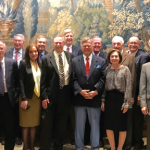Paula Marchetta, MD, MA, MBA, became a member of the ACR in 1989, during her rheumatology fellowship at Bellevue Hospital and the New York University (NYU) Medical Center. Just 10 years earlier, rheumatology had been an unlikely path. Dr. Marchetta—with a love of the arts—was pursuing Bachelor’s and Master’s degrees in English. But she found common threads between the pursuit of medicine and her love for language and story. This month, Dr. Marchetta, CEO and managing partner of Concorde Medical Group PLLC, becomes the next president of the ACR.
The Rheumatologist: With an educational background in English, how did you end up in rheumatology?
Dr. Marchetta: I had no intention of going into medicine when I started college. I loved the arts and humanities, and I wanted to be a writer. Halfway through college, I had an epiphany: … I was a good student, so I thought, “Where could you really use your abilities to the maximum capacity in service to others?”
I left the world of humanities behind and took a deep dive into a science curriculum when I started medical school. It was a really steep learning curve, but it gave me incredible discipline, because I always felt like I was not going to make it.
In my third year, when we started clinical rotations, I was able to use my ability to really synthesize and tell a story—which is really what I wanted to do. I could interview a patient and put things together in a medically logical way so that someone could read the history of the patient’s illness, understand the background, be able to generate differential diagnoses and understand not only what was wrong, but what needed to be done to treat the patient with a best guess until you had answers.
I would have stayed in internal medicine, but I wanted the more in-depth knowledge of a specialist in a field that had a whole-patient approach. Rheumatology was a natural draw for that. Rheumatology is the most intellectual of the medical subspecialties, and it’s full of wonderful people, incredibly interesting diseases and patients with whom we develop long-term relationships.
TR: You earned an MBA in 2009. How has that served you?
Dr. Marchetta: I became managing partner and CEO of Concorde Medical Group in 2002. Being someone who likes to be credentialed, I [earned] my MBA and have used that not only in managing the group, but also in service to NYU through committee work dealing with a lot of the changes in healthcare. Then I began volunteering with the College, and I went to the Committee on Finance, then to the Board and then to the Executive Committee as treasurer, which I really loved. It’s wonderful to be able to use the hard-earned knowledge I learned in business school in service to the College, which is what I have wanted to do—to give back to the ACR for all the wonderful things it does for the specialty and in educating us.
TR: As incoming president of the ACR, what are your goals? What challenges—and opportunities—do you see?
Dr. Marchetta: There are always challenges, and challenges become opportunities. The world is changing, but one of most exciting things we have spearheaded this year is we took the first step toward being a truly global society by hosting a rheumatology meeting outside of the U.S., in Dubai. I’m very hopeful we will build on that going forward. Part of that is the idea that the future is not just in the U.S., and there is tremendous desire throughout the world for the education provided by the ACR.
We also have a big generational shift going on, and we have to have an eye set to the needs of our “customers.” What do they really want, and are we still delivering if the demographics are changing? We don’t want to be obsolete or delivering educational products on a platform that is no longer as valuable to our members. We now can stream education online with ACR Beyond and it will only become better, more fine-tuned. And we are getting fellows involved as volunteers of the organization, so fellows are now on all standing committees. We have seen a tremendous amount of excitement and enthusiasm on their parts. We will soon be turning the baton over to a new generation, and we want to make sure we are keeping step and listening to them.
TR: You said you never aimed to become ACR president. Any words of wisdom for others progressing through their careers?
Dr. Marchetta: Concentrate on the job at hand, focus on the work. Do well with what you are charged with doing, and everything is going to take care of itself. It can be very difficult, more often, for women in clinical practice because we have so many obligations, but I love telling young women physicians that the career you start out thinking you are going to have may take a very different course. At times, you may have to do less to be there for family and children, but then that family grows up and you still have all your abilities and goals and ambitions, and your life is still ahead of you. Never stop doing it.
TR: When not managing a medical group, teaching, performing ward service or volunteering, what is the rest of your life like?
Dr. Marchetta: I have one son; he is all grown up now and a software engineer. I have always said I consider my son my greatest accomplishment. I also have a wonderful man in my life. Apart from working, I have studied and practiced tai chi for many years. I am a big fan of old movies, and I love the arts—I never really left that behind. I’m sort of an amateur home decorator. [Note: Dr. Marchetta’s house was once featured in a decorating magazine.] I enjoy going to museums and performances. And I am still a writer.
Kelly April Tyrrell writes about health, science and health policy. She lives in Madison, Wis.



